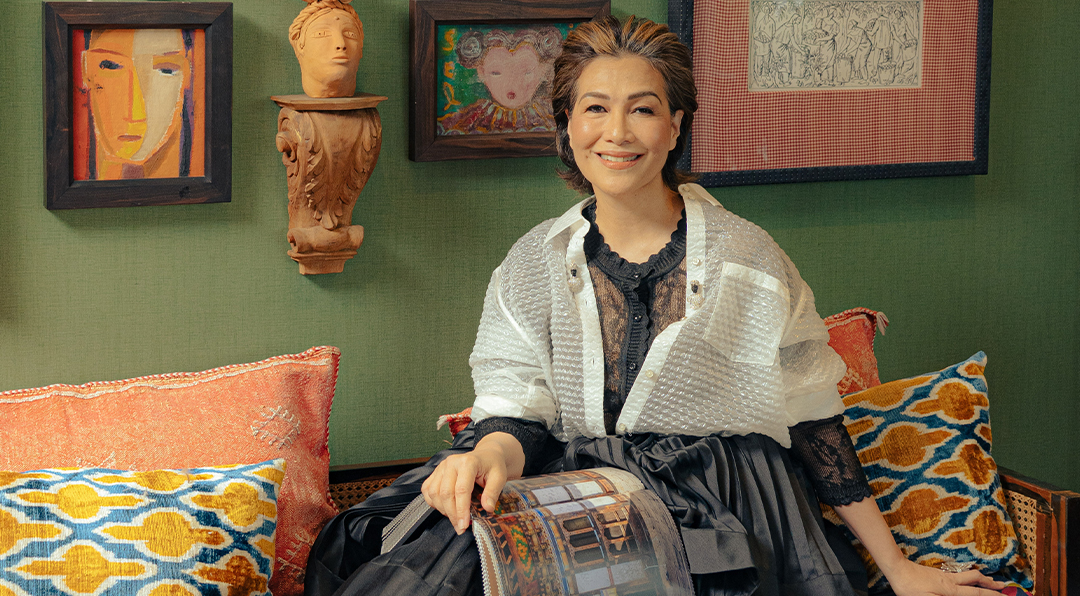

When Negros traders want to assert their soft power, they call on Marina Vargas Tantoco for assistance.
The woman friends fondly call “Nena” recently invited the lifestyle media over to sunny Villa Marina, the home she and husband Rico Tantoco built in Sta. Elena Golf and Country Estate in Laguna. The occasion was the launch of the 32nd Negros Trade Fair (NTF).
The lively and youthful matriarch walked around with a brown shawl around her shoulders while guests feasted on tangy KBL (kadyos, baboy at langka) soup, kansi, sotanghon with bagoong and banana heart, paksiw na bangus, lechon de leche, grilled prawns, and chicken inasal by Chicken Sarap.
“Touch it, feel how soft it is. This is made of silk,” Nena said of her shawl. “You can protect yourself from the cold yet it still works even in warm weather.”
Nena is herself a Negrense and patron of the annual NTF. This year’s edition runs Sept. 27-Oct. 1 at Ayala Malls’ Glorietta Activity Center.
This year’s theme is “Food for Thought,” and Bacolod-born chef JP Anglo was at Villa Marina to do a cooking demonstration of local cuisine.
Nena said helping out the NTF organizers was a “personal initiative” and a way of giving a nod to her Western Visayan roots.
Friendly encounters
Although raised in Manila, Nena recalled friendly encounters with sacada or seasonal plantation workers in her parents’ farm in genteel La Castellana.
“They plant, harvest and bring corn to the sugar mills. Entire families worked in the farms,” she recounted. “But sugar farming takes only six months, then there is nothing to do. During those difficult times, people would transform things from the forest, like wood or leaves, and turn them into beautiful things.”
Nena’s brown shawl was borrowed from Creative Definitions, co-owned by Mike and Banj Claparols. The two collaborated with Negros Nine weavers to enhance marketing and product development of woven items that use 100-percent Philippine cotton.
Mike said the NTF was organized in 1985 by 15 housewives in Negros Occidental, after the US government restricted sugar quotas received from the Philippines.

At the time, Negros Occidental’s economy depended on sugar exports.
“During the sugar crisis, the global levels became unsustainable, and sugar planters in our province lost a lot of opportunities,” Mike said. “The first fair was held at the old Quad Carpark. From there, more than 20 businessmen became exporters. Many discovered a love of art and we were able to create something out of the crisis and change people’s lives for the better.”
Creative Definitions, for instance, has tapped Negros Nine weavers from the remote mountains of Kabankalan, where employment opportunities are scarce.
“The main goal of the weaving project, as well as other Negros Nine projects, is to provide employment and improve the livelihood of people in remote areas,” said Mike.
Home accessories
Mariel San Agustin, one of the Villa Marina guests, brought samples of her Domesticity brand’s home accessories, kitchen essentials and storage pieces made by workers from San Carlos in Negros Occidental.
Domesticity employs beneficiaries of the Dr. Rafael San Agustin Legacy Village in San Carlos City, and conducts skills and training seminars for handicrafts and bag weaving. It also employs Gawad Kalinga beneficiaries who are seasonally employed sugar laborers.

Kiculo by KitKat Cusi Lobaton employs women in sugarcane farms. It creates innovative products using indigenous materials and traditional weaving done by local artisans.
Josephine Ruiz represented the Negrense Volunteers for Change (NVC) Foundation Inc. that works with artists and volunteers who train women in rural communities, out-of-school youth, the differently-abled and urban poor members who produce crocheted crafts, fiber and fabric art and beadwork.
Doreen Alicia Peña’s Silay Export produces bespoke products that allow sugarcane workers to organize, work at home and market their products with the assistance of the Department of Trade and Industry.
Nena credits her holiday visits to La Castellana and her mother Mameng Vargas’ natural flair for home decorating for developing her own love of handcrafted gifts such as those offered in NTF.

“My mom would spruce up the house with whatever, sometimes just tree trunks painted white. Right now, Villa Marina is my canvas and I am doing the same thing,” said the woman who once took Rustan’s Flower Shop several tiers up in the home decorating arena.
“I can feel a connection with the Negros traders. My family lived on a sugar farm and Villa Marina was once part of a sugar plantation. I am going back full circle today at 70 years old. I am reliving my childhood and sharing our culture at the same time,” Nena added.

The 32nd Negros Trade Fair runs from Sept. 27 to Oct. 1 at the Glorietta Activity Center, Glorietta 3, Ayala Malls, Makati. E-mail [email protected]; Facebook The Negros Trade Fair; Instagram @negrostradefair_32nd















































